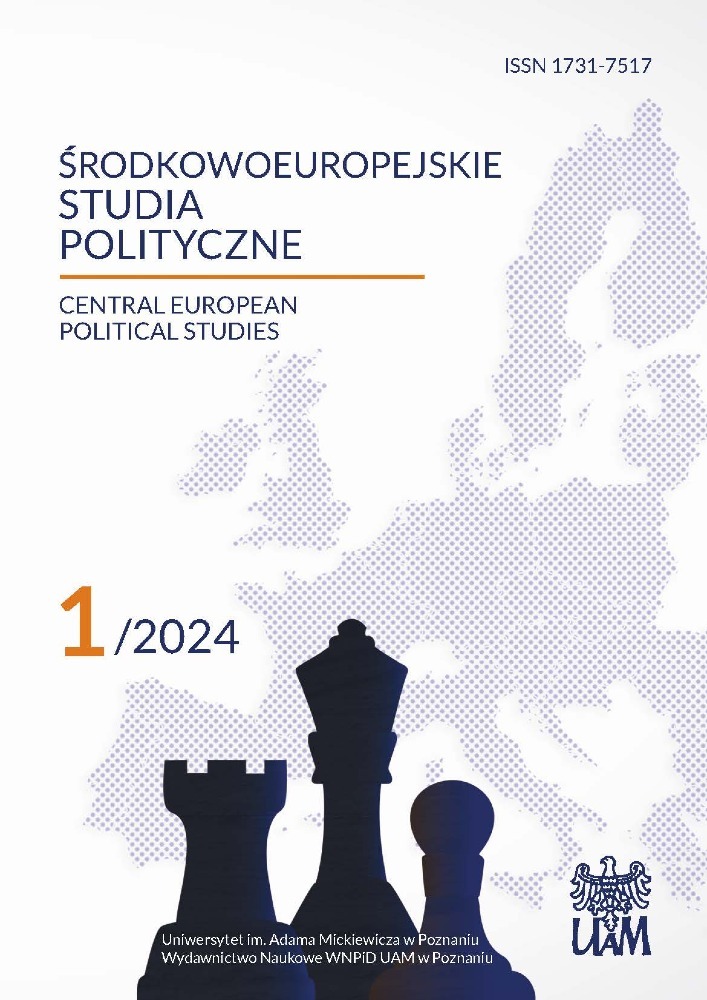Abstract
The relationship between Polish nationalism and fascism and National Socialism has been the subject of numerous publications, especially those that are part of the Polish scientific literature. There is a peculiar asymmetry embedded in this relationship. During the interwar period and nowadays, this subject has been reflected on rather on the Polish side rather than the German side. The author attempts to answer a question about reasons for this asymmetry. In the 1930s, German interest in Polish nationalism was limited. Publications dealing specifically with Eastern European issues were the only to designate more space and attention to the topic. The publications, however, almost completely ignored official NSDAP sources. The shape and evolution of the national camp in Poland focused on a few issues only and it was a domain of a few authors whose names appear in various periodicals. In Germany, a hypothetical explanation for this phenomenon is based on fundamental contradictions that divided the Polish and German forms of nationalism at the time, namely the absence of the biological-racial dimension in the Polish national ideology and its strong connection with Catholicism. The practical absence of the Polish national movement in German articles of the 1930s might be attributed to the doctrine and racist objectives of National Socialism.
References
Dunin Wąsowicz K. (1948), Die polnische Nationaldemokratie. Recenzja, „Przegląd Historyczny”, no. 37.
Das junge Polen (1934/5), “Osteuropa”, R. 10.
Der neue Polenspiegel. Selbstbezeugnisse polnischen Eroberungswillens (1930), Berlin.
Der Judendietrich der Endeken (1936), “Ostland”, R. 17, no. 7.
“Der Weltkampf” (1938), R. 15, z. 1.
Fuchs W. (1930), Der neue Polenspiegel. Selbstzeugnisse polnischene Eroberungswillens, Deutsche Ostmarkenverein, Berlin.
Grott O. (2010), Polski ruch narodowosocjalistyczny w latach 30. XX wieku, in: Acta Universitatis Wratislaviensis, Studia nad Faszyzmem i Zbrodniami Hitlerowskimi, XXXII, Wrocław.
Hartmann H. (1934), Slawen, Romanen, Germanen als Gestalter europaeischen Schicksals, “Zeitschrift fuer Politik”, R. 22.
Hecker H. (1974), Die Tat und ihr Osteuropabild 1909–1939, Wissenschaft und Politik, Koeln.
Hoetsch O. (1934), Osteuropa und Deutscher Osten, Ost-Europa-Verlag, Berlin.
Kawalec K. (1989), Narodowa Demokracja wobec faszyzmu 1922–1939, PIW, Warsaw.
Kostkiewicz J. (2020), Polski nurt krytyki nazizmu przed rokiem 1939. Aspekty ideologiczne i pedagogiczne, Arcana, Kraków.
Koziełło T. (2005), Trzecia Rzesza Niemiecka w poglądach Narodowej Demokracji, „Annales Universitatis Mariae Curie-Skłodowska. Sectio K, Politologia” 12.
Kotowski A. S. (2006), Narodowa demokracja wobec nazizmu i Trzeciej Rzeszy, Wydawnictwo Adam Marszałek, Toruń.
Laeuen H. (1938/9), Roman Dmowski, “Jomsborg”, R. 2.
Lipski J. J. (2015), Idea Katolickiego Państwa Narodu Polskiego. Zarys ideologii ONR Falanga, Wydawnictwo Krytyki Politycznej, Warsaw.
Macała J. (2000), Między akceptacją a odrzuceniem faszystowskich wzorów. Z dyskusji wokół totalizmu katolickiego w polskiej prasie politycznej przed 1939 r., “Studia nad Faszyzmem i Zbrodniami Hitlerowskimi”, vol. XXIII, Wrocław.
Maciejewski M. (2011), Najwcześniejsze polskie interpretacje nazizmu (1922–1924), Acta Universitatis Wratislavensis, in: Studia nad Faszyzmem i Zbrodniami Hitlerowskimi, vol. XXXIII, Wrocław.
Maciejewski M. (2014), Stosunek Adolfa Hitlera do spraw polskich od zarania nazizmu do jego upadku, “Studia nad Autorytaryzmem i Totalitaryzmem” 2014, no. 2.
Marszał M. (2001), Włoski faszyzm i niemiecki narodowy socjalizm w poglądach ideologów Narodowej Demokracji 1926–1939, Wydawnictwo Kolonia Limited, Wrocław.
Maschke E. (1933/4), Krise der polnischen Jugend, “Die Tat”, R. 25.
Maschke E. (1934/5), Roman Dmowski, “Osteuropa”, R. 10.
Maschke E (1938/9), Roman Dmowski 1864–1939, “Osteuropa”, R. 14.
Musielak M. (1997), Nazizm w interpretacjach polskiej myśli politycznej okresu międzywojennego, Wydawnictwo Poznańskie, Poznań.
„Nation und Staat. Deutsche Zeitschrift für das europäische Nationalitätenproblem”, (1941/42), R. 13.
Oertzen von F. W. (1933), Der Nachbar im Osten, “Zeitschrift fuer Politik”, R. 23.
Oertzen von F. W. (1933/4), Die polnische Gefahr, “Die Tat”, R. 25.
Oertzen von F. W. (1939), Dmowski, “Volk und Reich’, R. 15.
“Osteuropaeische Lageberichte” (1935), no. 11.
“Osteuropaeische Lageberichte” (1936), no. 19.
“Ostland” (1932), R. 13, no. 17. DOI: https://doi.org/10.2307/315174
“Ostland” (1934), R. 15, no. 16. DOI: https://doi.org/10.1111/j.1651-2227.1934.tb04487.x
“Ostland” (1935), R. 16, no. 16. DOI: https://doi.org/10.3109/00016923509176437
Puttkamer von E. (1944), Die polnische Nationaldemokratie, Institut für Deutsche Ostarbeit, Krakau.
Recke W. (1927), Die polnische Frage als Problem der europaeischen Politik, G.Stilke Verlag, Berlin.
Rudnicki S. (1985), Obóz Narodowo Radykalny. Geneza i działalność, Czytelnik, Warsaw.
Schmidt A. (1932), Polen und Ostpreussen, “Zeitschrift fuer Politik”, R. 22., DOI: https://doi.org/10.1515/9783111478890
Sillinger E. (1933/4), Um Polens innere Ordnung, “Die Tat”. R. 25.
Szołdra K. (2019), Prasa endecka wobec przejęcia władzy w Niemczech przez Adolfa Hitlera a kwestia bezpieczeństwa w Europie, „Bezpieczeństwo. Teoria i praktyka”, no. 1.
Tomasiewicz J. (2019), W kierunku nacjokracji. Tendencje autorytarne, totalistyczne i profaszystowskie w polskiej myśli politycznej (1933–1939), Wydawnictwo Uniwersytetu Śląskiego, Katowice.
“Volk und Reich” (1936), R. 12.
“Volk und Reich” (1939), R. 15. DOI: https://doi.org/10.1007/978-3-662-11510-7_4
Wapiński R. (1981), Narodowa Demokracja 1893–1939. Ze studiów nad dziejami myśli nacjonalistycznej, Ossolineum, Wrocław.
Wapiński R. (1988), Roman Dmowski, Wydawnictwo Lubelskie, Lublin.
Weingaertner A. (1979), Nation und Staat. Eine Monographie, Newacademic Press, Wien.
“Zeitschrift fuer Geopolitik” (1934), R. 11.
License
Copyright (c) 2024 Paweł Stachowiak

This work is licensed under a Creative Commons Attribution-ShareAlike 4.0 International License.

